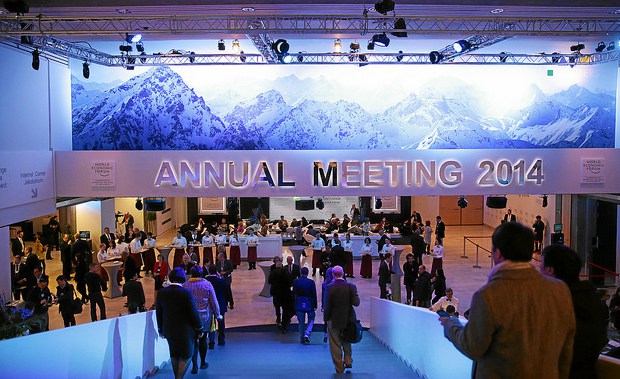30 Jan 2014


The World Economic Forum engages business, political, academic and other leaders of society to shape global, regional and industry agendas. Image by World Economic Forum.
Last week, I was at the World Economic Forum in Davos, the first time that the Oxford Internet Institute has been represented there. Being closeted in a Swiss ski resort with 2,500 of the great, the good and the super-rich provided me with a good chance to see what the global elite are thinking about technological change and its role in ‘The Reshaping of the World: Consequences for Society, Politics and Business’, the stated focus of the WEF Annual Meeting in 2014.
What follows are those impressions that relate to public policy and the internet, and reflect only my own experience there. Outside the official programme there are whole hierarchies of breakfasts, lunches, dinners and other events, most of which a newcomer to Davos finds it difficult to discover and some of which require one to be at least a president of a small to medium-sized state — or Matt Damon.
There was much talk of hyperconnectivity, spirals of innovation, S-curves and exponential growth of technological diffusion, digitalization and disruption. As you might expect, the pace of these was emphasized most by those participants from the technology industry. The future of work in the face of leaps forward in robotics was a key theme, drawing on the new book by Eric Brynjolfsson and Andrew McAfee, The Second Machine Age: Work, Progress and Prosperity in a Time of Brilliant Technologies, which is just out in the US. There were several sessions on digital health and the eventual fruition of decades of pilots in telehealth (a banned term now, apparently), as applications based on mobile technologies start to be used more widely. Indeed, all delegates were presented with a ‘Jawbone’ bracelet which tracks the wearer’s exercise and sleep patterns (7,801 steps so far today). And of course there was much talk about the possibilities afforded by big data, if not quite as much as I expected.
The University of Oxford was represented in an ‘Ideas Lab’, convened by the Oxford Martin School on Data, Machines and the Human Factor. This format involves each presenter talking for five minutes in front of their 15 selected images rolling at 20 seconds each, with no control over the timing (described by the designer of the format before the session as ‘waterboarding for academics’, due to the conciseness and brevity required — and I can vouch for that). It was striking how much synergy there was in the presentations by the health engineer Lionel Tarassenko (talking about developments in digital healthcare in the home), the astrophysicist Chris Lintott (on crowdsourcing of science) and myself talking about collective action and mobilization in the social media age. We were all talking about the new possibilities that the internet and social media afford for citizens to contribute to healthcare, scientific knowledge and political change. Indeed, I was surprised that the topics of collective action and civic engagement, probably not traditional concerns of Davos, attracted widespread interest, including a session on ‘The New Citizen’ with the founders of Avaaz.
Of course there was some discussion of the Snowden revelations of the data crawling activities of the US NSA and UK GCHQ, and the privacy implications. A dinner on ‘the Digital Me’ generated an interesting discussion on privacy in the age of social media, reflecting a growing and welcome (to me anyway) pragmatism with respect to issues often hotly contested. As one participant put it, in an age of imperfect, partial information, we become used to the idea that what we read on Facebook is often, through its relation to the past, irrelevant to the present time and not to be taken into consideration when (for example) considering whether to offer someone a job. The wonderful danah boyd gave some insight from her new book It’s Complicated: the social lives of networked teens, from which emerged a discussion of a ‘taxonomy of privacy’ and the importance of considering the use to which data is put, as opposed to just the possession or collection of the data – although this could be dangerous ground, in the light of the Snowden revelations.
There was more talk of the future than the past. I participated in one dinner discussion of the topic of ‘Rethinking Living’ in 50 years time, a timespan challenged by Google Chairman Eric Schmidt’s argument earlier in the day that five years was an ‘infinite’ amount of time in the current speed of technological innovation. The after dinner discussion was surprisingly fun, and at my table at least we found ourselves drawn back to the past, wondering if the rise of preventative health care and the new localism that connectivity affords might look like a return to the pre-industrial age. When it came to the summing up and drawing out the implications for government, I was struck how most elements of any trajectory of change exposed a growing disconnect between citizens, or business, on the one hand – and government on the other.
This was the one topic that for me was notably absent from WEF 2014; the nature of government in this rapidly changing world, in spite of the three pillars — politics, society, and business — of the theme of the conference noted above. At one lunch convened by McKinsey that was particularly ebullient regarding the ceaseless pace of technological change, I pointed out that government was only at the beginning of the S-curve, or perhaps that such a curve had no relevance for government. Another delegate asked how the assembled audience might help government to manage better here, and another pointed out that globally, we were investing less and less in government at a time when it needed more resources, including far higher remuneration for top officials. But the panellists were less enthusiastic to pick up on these points.
As I have discussed previously on this blog and elsewhere, we are in an era where governments struggle to innovate technologically or to incorporate social media into organizational processes, where digital services lag far behind those of business, where the big data revolution is passing government by (apart from open data, which is not the same thing as big data, see my Guardian blog post on this issue). Pockets of innovation like the UK Government Digital Service push for governmentwide change, but we are still seeing major policy initiatives such as Obama’s healthcare plans in the US or Universal Credit in the UK flounder on technological grounds. Yet there were remarkably few delegates at the WEF representing the executive arm of government, particularly for the UK. So on the relationship between government and citizens in an age of rapid technological change, it was citizens – rather than governments – and, of course, business (given the predominance of CEOs) that received the attention of this high-powered crowd.
At the end of the ‘Rethinking Living’ dinner, a participant from another table said to me that in contrast to the participants from the technology industry, he thought 50 years was a rather short time horizon. As a landscape architect, designing with trees that take 30 years to grow, he had no problem imagining how things would look on this timescale. It occurred to me that there could be an analogy here with government, which likewise could take this kind of timescale to catch up with the technological revolution. But by that time, technology will have moved on and it may be that governments cannot afford this relaxed pace catching up with their citizens and the business world. Perhaps this should be a key theme for future forums.
Helen Margetts is the Director of the OII, and Professor of Society and the Internet. She is a political scientist specialising in digital era governance and politics.